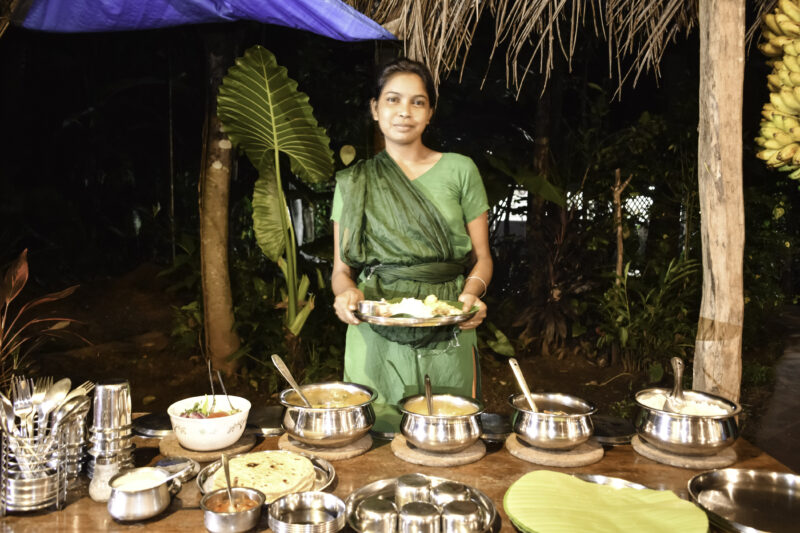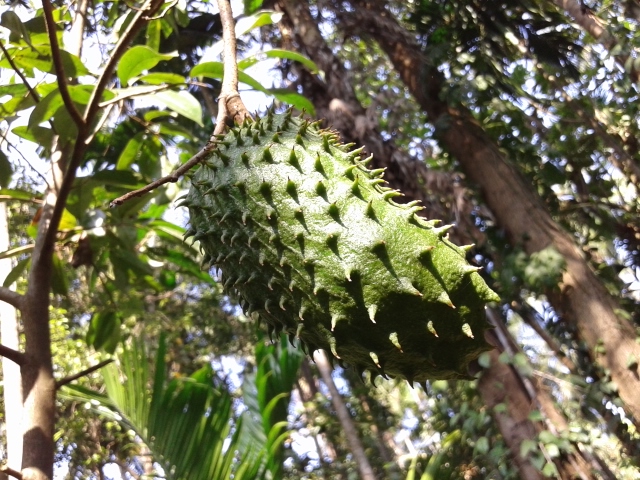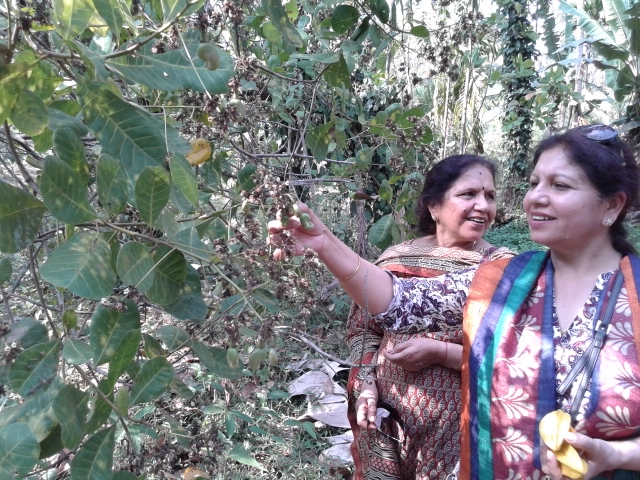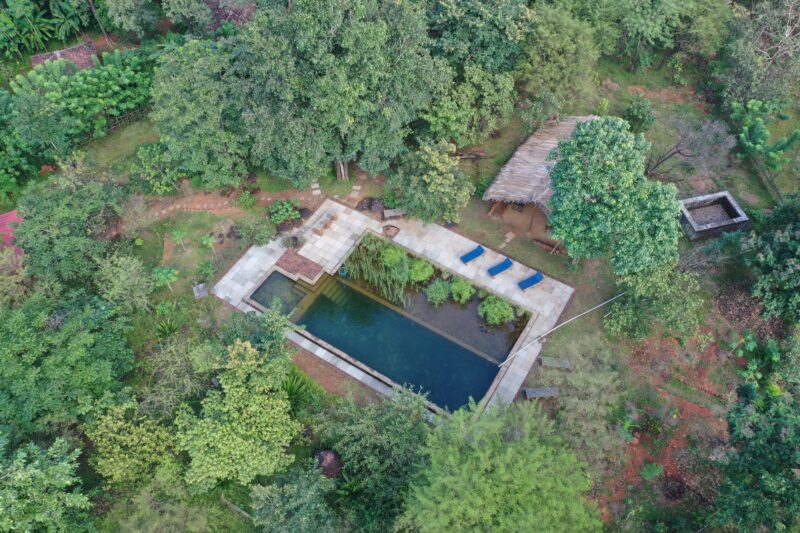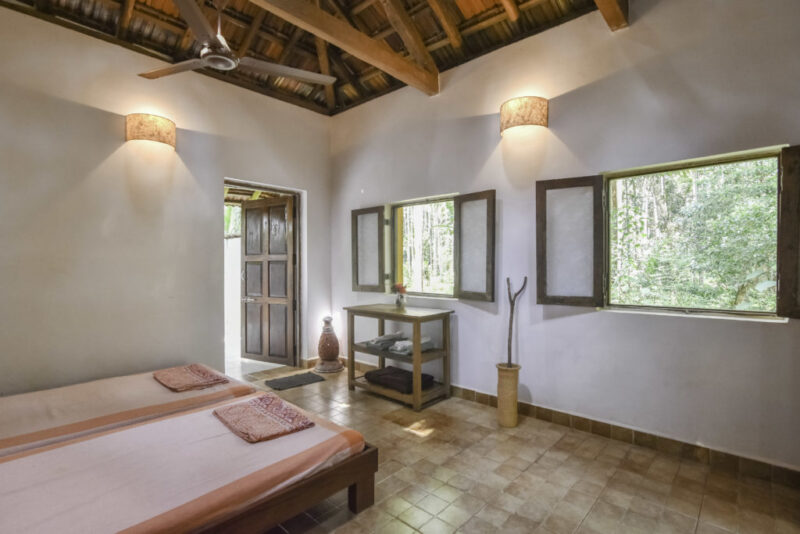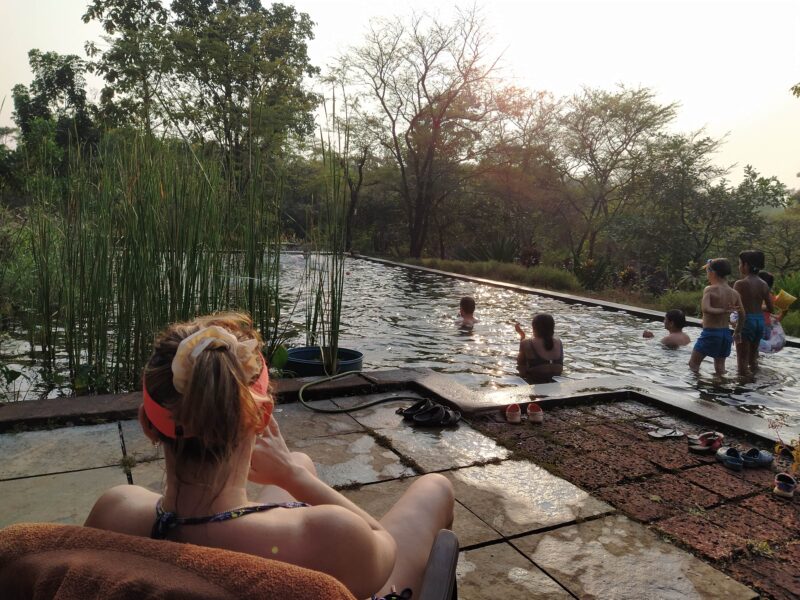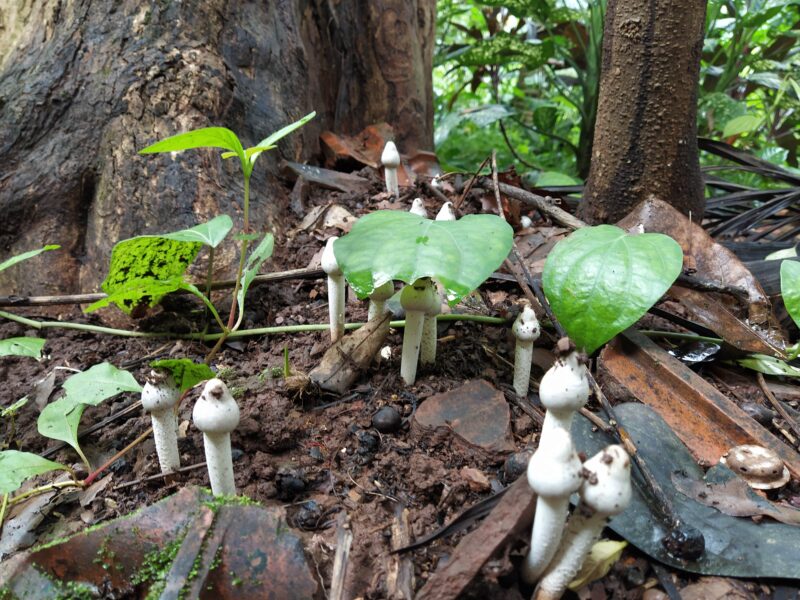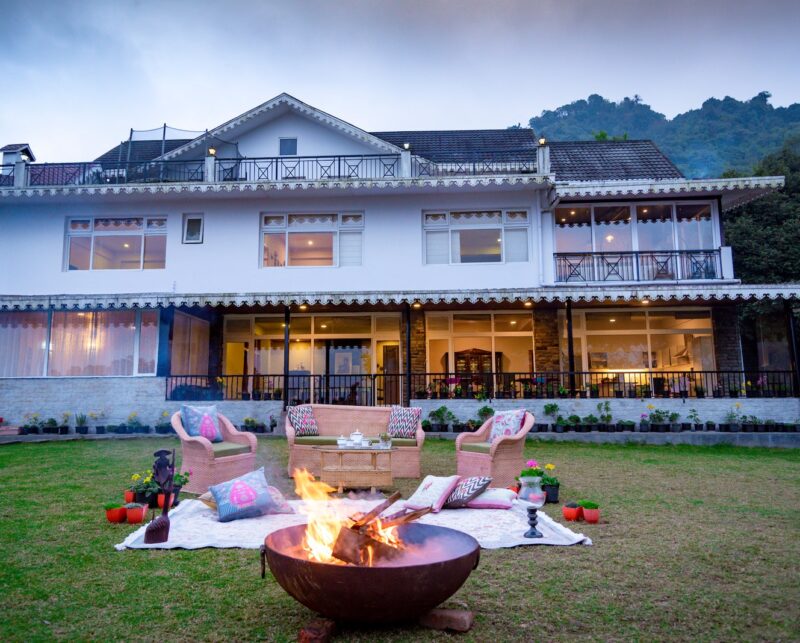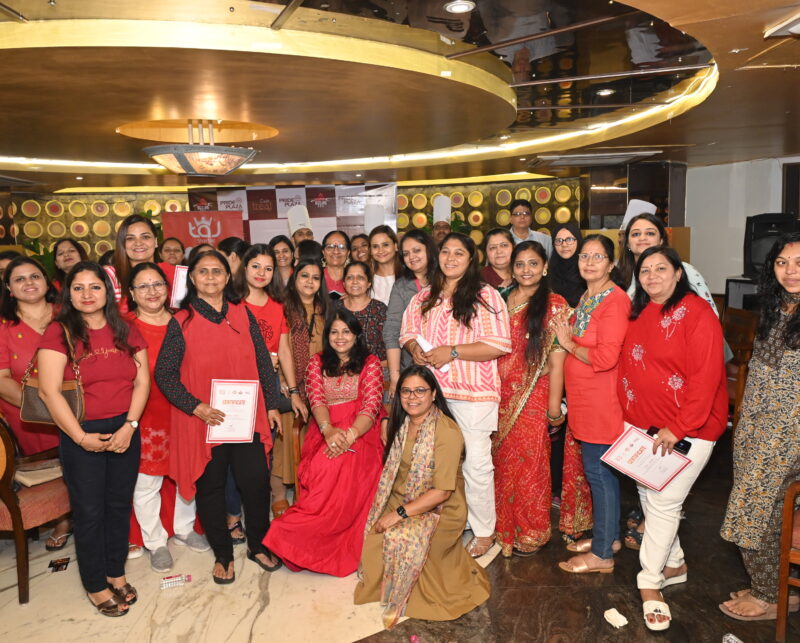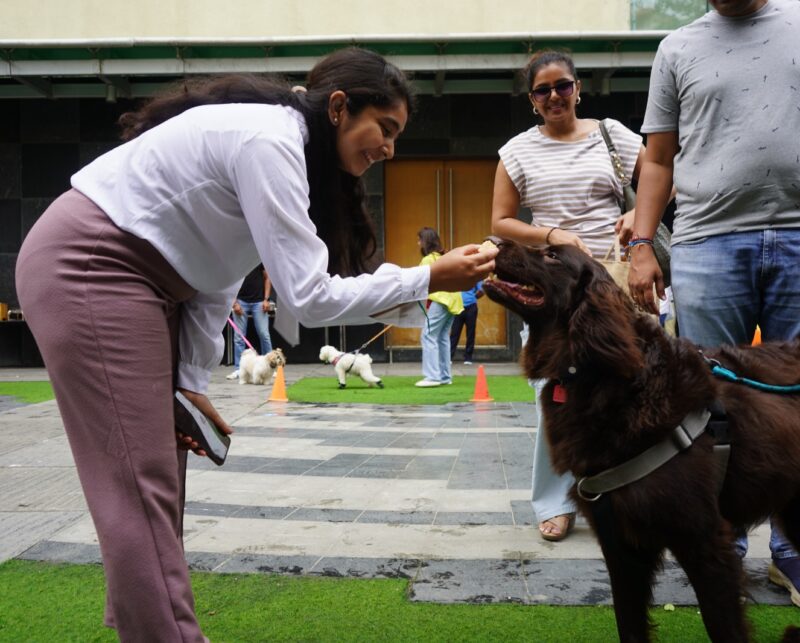Goa’s heartland or midlands, between the Western Ghats and the Arabian Sea, provide a suitable
environment for the growing of spices, cashew and fruits. Today, some of these spice gardens are
open for visitors, who can join a tour of the plantation with the staff followed by Goan farmer’s
lunch and a visit to an in-house shop to buy local produce.
DUDHSAGAR SPICE PLANTATION
Ashok Malkarnekar
My parents Doris and Ajit met at Hemalkasa, my mother was a young volunteer from Germany,
and my father was part of a team setting up the project aiming to uplift tribals and rehabilitate
leprosy patients, under Baba Amte’s guidance. In the 1980s, they decided to venture into organic
farming – they subsequently transformed a barren piece of land in the eastern parts of Goa into a
green paradise, always focusing on sustainable and eco-friendly practices. Today, the land could
be characterised as a bird sanctuary, butterfly park and organic plantation all-in-one. Over the
years, friends from all over the country and the world started visiting us, some very regularly. I
myself was working with the German Development Agency GIZ, engaging with highly qualified
experts and often accompanying them to rural areas too. As a person who had grown up largely
in a rural environment, I was surprised to see disconnect many urban colleagues had with rural
surroundings and also specifically with the source of their food. In this disconnect I saw the
opportunity to offer people a space to reconnect with nature while exploring healthy local foods.
We followed the principle ‘small is beautiful’, and tried to minimise any disruptions to the local
ecosystem. We limited ourselves to building five cottages in vernacular architecture, taking the
help of local craftsmen and using locally available materials like laterite from the surrounding
areas. To cool off, we created a natural water swimming pool, which has a plant based filtration
system and is completely free of chlorine and other harmful substances. We created a nature trail
for our guests to explore, and we usually take them on a spice walk, in which they learn about
how your everyday spices are grown.
During the cashew season, we also host a cashew trail during which our guests get to experience
the journey from farm to bottle, starting with picking and stomping, ending with distillation and
sampling of our various cashew spirits (currently Urak, Feni and our flagship Spiced Premium
Cashew Feni OURO, which will be launched soon).
Hospitality was kind of new for us, so it was indeed a learning experience, and still is. But we
also had a rich history of travel throughout Europe and South East Asia to fall back on, and a
good understanding of the requirements and preferences of Western visitors, on whom we
initially focussed. We got a very good response from the beginning. And it seems that we began
at the right time, when the trend of a more experiential and eco-friendly tourism just started
becoming relevant in India. Now we have a balanced mix of domestic and overseas visitors.
Many people are even today unaware of all the beautiful things Goa has to offer aside from its
beaches. Fortunately, the Dudhsagar Region, as we like to call it, has a lot to offer – so we
curated a five day itinerary which has treks and trails to various waterfalls, a visit to Goa’s oldest
temple, historic rock carvings dating back more than 8000 years, a glimpse into Goa’s
Portuguese period at historic colonial mansions, and a whole lot of other things – this helped
answer the question some guests had, as to what do we do and served them as an orientation to
plan out their stay. We also highlight the potential for birdwatching and naturalism, and arrange
night safaris in the surroundings. A very interesting phenomenon is the bioluminescence that can
be observed in local forests on particular occasions.
We generally have a very interesting clientele at the farmstay – different from the stereotype Goa
tourist, well-educated and fun to interact, from different professional backgrounds so that sitting
on our farm we learn a lot about the latest trends in fields ranging from finance to AI. We
appreciate that our guests realise that we’re a homestay on a farm, not a resort, accordingly,
meals are served in a communal setting at predetermined times, and interaction is encouraged
(many have left as friends).
We serve home cooked Goan vegetarian cuisine, by and large based on Goan Saraswat
preparations. We keep cows, so we have the luxury of serving milk from happy cows. We make
ghee, yoghurt and all sorts of kheers. We do not use refined oils, rather, we cook using home-
made coconut oil. We usually include locally grown seasonal vegetables in our menus. Jackfruit
when it is in season, and with the onset of the rains, we can forage for all sorts of interesting wild
growing veggies and wild mushrooms. We also indulge in traditional methods of preserving
foods, like making wodio from ashgourd to last us through the rains, dehydrating various fruits,
and making pickles and jams.
Overall, our meals are intentionally light all-you-can-eat affairs. . We enjoy serving dishes that
are locally rooted, many of which can’t be found in normal restaurants. One of these is a Goan
vegetable stew known as Khatkate. Another special is the meals we serve up for our cashew trail
experience.
There’s plenty of space on our 50 acre property for long walks on our nature trail, and a
neighborhood walk with two river crossings, and a trek down the stream to a hidden waterfall.
Our guests can learn about our everyday spices on our spice tour – many of which we use
frequently, but might be surprised to see as a plant… We also offer distillery visits and tasting
sessions of our handcrafted cashew spirits, which also form a part of the Cashew trail experience
(which is only available during the cashew season). The Cashew Trail Experience takes our
guests on a journey from farm to bottle – we partake in the picking of cashew apples, then stomp
the fruit to extract the juice, and lastly see how the fermented cashew juice is distilled into
Cashew Feni. Roasting and peeling of cashew nuts allows us to appreciate the hard work going
into the production of a handful of ready-to-eat nuts, and a menu centred around specialities
largely prepared using the cashew apple rounds off the experience.
We are strongly focused on sustainable practices – we have a biogas digester which generates a
part of the gas used in cooking, and produces valuable manure in the process. Our unique natural
water swimming pool with plant based filtration system completely avoids harmful chemicals
and is a pleasure both visually as well as for the hair, skin and eyes. During the rains, the trek to
our hidden waterfall, down a stream to a cascade tucked away in the forest is a once in a lifetime
experience. And in summers, the Dudhsagar River is just a short walk away – great for an
afternoon swim in serene green surroundings, disturbed only by the odd monkey swaying on a
bunch of bamboo across the river.
We are looking forward to collaborating with local schools and colleges to allow students to
enjoy nature and inculcate whole systems thinking and environmental awareness, our way of
giving back. We are currently also taking our first steps in beekeeping and look forward to
providing high quality unadulterated honey soon. We are planning to become fully energy self-
sufficient within the next two years by using photovoltaic solar roof top systems to generate
electricity. And as third generation Feni distillers, we take great pride in introducing our small
batch artisanal spiced feni aptly named OURO (translates into ‘Gold’) to the world – we’re
following a novel distribution model wherein the consumer can book the bottles with us for pick
up at a few select outlets in Goa.
THE PONDA – PRIOL SPICE TRAIL
Savoi Spice Plantation, Sahakari Spice Farm, and Tropical Spice Plantation are tourist-friendly
spice plantations that are located near the road linking Ponda to Priol. Typically, the spice
plantation tour begins with an introductory talk followed by a walk through fruit orchards and
spice gardens. During the stroll, a guide gives information about all the plants you pass starting
with cardamom and pineapple, then going up to see the cinnamon, nutmeg, banana, breadfruit,
cashew and star apple. At the top you see jackfruit and mango trees. The tour usually ends with
watching men swinging among the areca palms to harvest betel nuts. The tour usually includes a
Goan lunch. You can buy spices, dry fruits, berries and medicinal herbs at the plantation shops.
TANSHIKAR SPICE FARM
Tanshikar’s Working Spice Farm & Ecological Rest House is situated among the
rainforest of Western Ghats at Netravali village, Sanguern taluka. The specialties of the
farm include the organic produce and the variety of spices grown in 25 Acres out of the
total 40 Acres land area of the farm. Goan food is served in clay utensils at the
restaurant made using bamboos and coconut palm leaves.
At the farm shop you can buy:
Vanilla,
Cinnamon,
Clove,
Nutmeg
Mace
Chili
Cardamom
Black Cardamom
Black pepper
White pepper
Green pepper
Turmeric unprocessed
Green coffee and roasted coffee beans.
Raw cocoa powder




